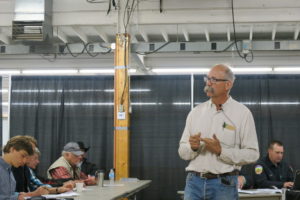Diversification of practices and approaches to ranching throughout the West are issues at the forefront of ranchers and land use managers. From the complex relationships in grazing management to discussions on ranching in sync with nature, sustainability and profitability, coupled with measuring the health of land, livestock and plants are all topics of concern. Family and business communication dynamics are crucial. Participants at the recent Grass-Grazers-Families: Finding Common Ground workshop dove into all of these arenas as speakers led them through three days of training in Pueblo last fall.
Executive board members of the Colorado Section Society for Range Management (CSSRM) had been looking for ways to bring together livestock producers and range management professionals together to ensure that the two groups were able to receive the same type of training. Understan ding the needs and goals of each land use group has been a high priority for range managers and for Colorado State University Extension. The two groups partnered in an effort to bring an educational experience to both sets of learners
ding the needs and goals of each land use group has been a high priority for range managers and for Colorado State University Extension. The two groups partnered in an effort to bring an educational experience to both sets of learners
“A connection between topics helped participants understand how actions in one area could impact results in another,” said Michael Fisher, county director for the Pueblo County Extension office. “We also hoped to remind participants how to view rangeland management and ranching as a system.”
Attendees came from Colorado, California, Montana, Nebraska, New Mexico, and Wyoming. They heard from fourteen speakers and saw five separate demonstrations outdoors. Live demonstrations outlined strategies to take action on local operations or through their consultation with clients. These topics included both permanent and temporary fencing, pumping water with solar equipment, packing equipment with mules, and utilizing drones on the ranch.
Behavioral ecologist Fred Provenza presented strategies on how to better ‘know the land’ and connecting understanding of livestock and wildlife behavior on rangeland to how humans take care of (or sometimes fail to take care of) their own nutrition and health. Frank Garry, Colorado State University Extension veterinarian, walked the group through the hazards of Johne’s Disease in rangeland cattle herds.
CSU associate professor Paul Meiman, along with graduate students Kevin Jablonski, and Jordan Spaak spoke about university rangeland research initiatives. Nick Trainor talked with the audience about how to build the future of ranch operations when operating on leased land. The complex relationships in grazing management was featured by Grady Grissom and Steve Oswald followed this up with a discussion on ranching in sync with nature. Kit Pharo shared his thought on how to be profitable ranching in today’s economy and environment.
CSU Extension agriculture and business management specialist Jeff Tranel opened day three with an engaging discussion about communications on the ranch and best strategies to leave a sound financial legacy. The audience learned about research being conducted by Hailey Wilmer which looks at the social and ecological outcomes that result from the decisions made by ranchers. Colorado rancher Duke Phillips visited with the group about how his family looks at business diversification on their working ranch. Newly appointed CSU Extension beef specialist Ryan Rhoades wrapped up the conference by looking at the systems approach to ranching and tied in where the various presentations over the three-day conference could fit into the systems approach.
“It’s exciting to see evaluation data from the conference that indicates around 80% of respondents said that as a result of this conference they would change the way they manage or recommend management of resources,” said Fisher. “It indicates that attendees of this conference will implement knowledge gained that may help to increase the sustainability of their operation or those operations to which they influence the decision making process.”
Retta Bruegger, Extension western region range specialist, received award was Outstanding Young Professional Award. Bruegger was recognized for her work as coordinator of the Learning from the Land project. Learning from the Land promotes adoption and application of state-and-transition models (STMs) for adaptive management of sage-grouse habitat in northwestern Colorado and Wyoming.
Maria Fernandez-Gimenez, CSU professor in forest and rangeland stewardship, received an award for an Outstanding Publication/Contribution for a paper titled: A Shepherd Has to Invent: Poetic Analysis of Social-Ecological System Change in the Cultural Landscape of the Central Spanish Pyrenees.
Partial funding for the conference was provided by the Western Sustainable Agriculture Research and Education (W-SARE) program. “This was a very diversified program reaching agriculture producers, non and governmental agencies, and a variety of business people throughout the West searching and finding common ground,” said Bill Nobles, one of the W-SARE Colorado representatives. He noted that this is the type of collaborative effort that resonates well with W-SARE’s outreach and education goals.